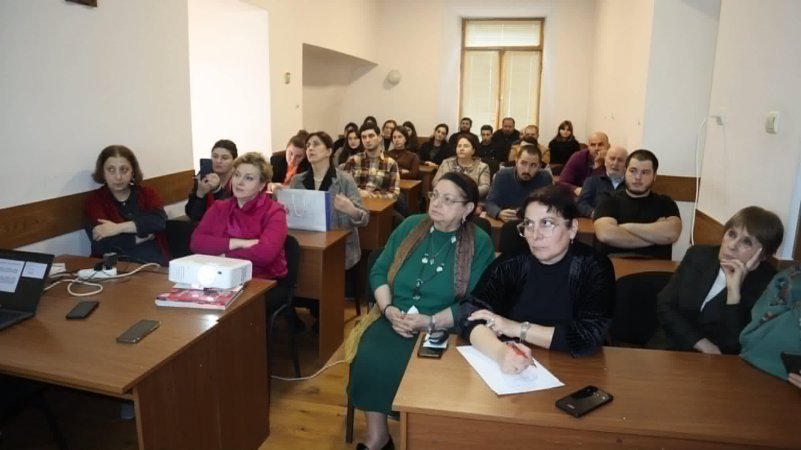On November 25 of this year, within the framework of the traditional “Public Lectures” at the Tbilisi Theological Academy and Seminary, a meeting was held with Dr. Lia Karichashvili, a research fellow at the Rustvelology Research Center of the Shota Rustaveli Institute of Georgian Literature. The topic of the lecture was “The Catholicos-Patriarchs of Georgia on The Knight in the Panther’s Skin.”
The speaker expressed gratitude to the Academy and Seminary for their cooperation and offered special thanks to the Rector of the institution, Protosyngellos Giorgi Zviadadze.
Ms. Lia spoke in detail about the views expressed in the letters,
scholarly works, and sermons of the Catholicos Patriarchs — Anton
I, Kirion II, Kalistrate Tsintsadze, Ephraim II, and Ilia II. She
noted that the attitudes of the Patriarchs clearly reflect the
position of the Georgian Church toward the great poet and his
immortal The Knight in the Panther’s
Skin.
We
offer several excerpts from Ms. Lia’s presentation:
“Catholicos Anton I, an exceptionally well-read and educated figure, gave the works of Rustaveli the highest praise in his Tsqobilsitvqoba (‘Well-Ordered Speech’). He called him a sage, a philosopher, a theologian, an ‘extraordinary singular poet-artist,’ though he also expressed regret that Rustaveli composed not a theological work, but a secular one.”
“Patriarch Kirion II authored several Rustvelology articles that were published during his episcopacy (in 1895 and 1904). He discusses the 1888 edition of the poem, examines two previously unknown manuscripts of The Knight in the Panther’s Skin, describes them, and even offers important readings of certain verses.”
“Patriarch Kalistrate Tsintsadze’s work On the Worldview of the Author of The Knight in the Panther’s Skin was written in 1936 but published later, in 1966, under the pseudonym K. Ekashvili. In this study, the artistic portraits of the poem’s characters are examined critically. It also contains reasoned theological reflections, supported by patristic literature, on such concepts as ‘the sun,’ ‘sunny night,’ ‘one unity,’ and ‘timeless time.’ The Patriarch considered unfounded the widely held belief among some scholars that The Knight in the Panther’s Skin had been persecuted by the clergy. He saw no ‘heretical ideas’ in the poem.”
“Catholicos-Patriarch Ephraim II, in his work On Rustaveli’s Confession and the ‘Persecution’ of The Knight in the Panther’s Skin, discusses the poet’s religious creed, ideals, and values, concluding that Rustaveli is a Christian poet and that The Knight in the Panther’s Skin is a magnificent monument of Christian creativity and culture.”
The same idea is developed and thoroughly substantiated by Catholicos Patriarch, His Holiness and Beatitude Ilia II in his 1966 article Shota Rustaveli and His Theological Views. He focuses on the poet’s religious beliefs, the biblical beginning of the poem, the author’s profound knowledge of theosophical issues, and the theological terminology in The Knight in the Panther’s Skin, as seen in the prologue, Avtandil’s “Prayer,” the “Testament,” and other episodes.
The analysis of the works of the Catholicos Patriarchs shows that they considered Rustaveli a Christian and The Knight in the Panther’s Skin a work based on biblical-Christian teachings,” noted Ms. Lia.
The lecture was attended by the students, teachers and professors of the institution. The lecture was indeed very interesting, and there was expressed a desire for further engagement with Ms. Lia Karichashvili.







